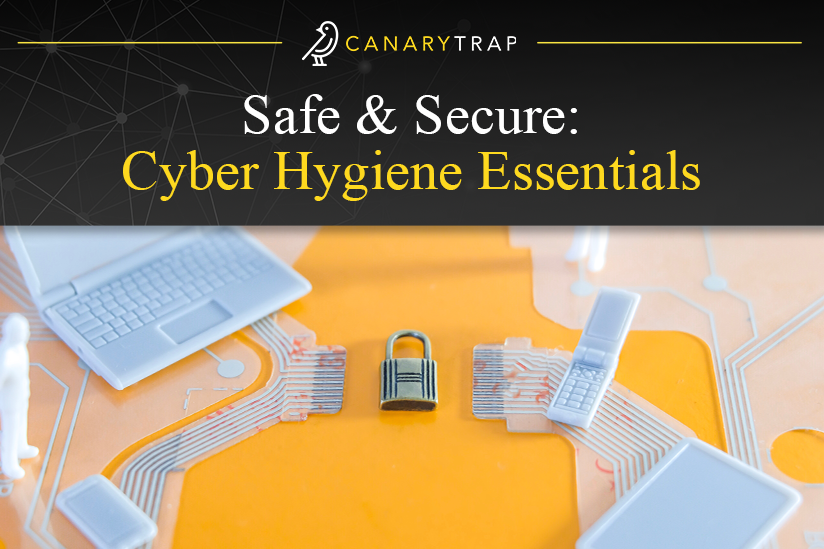Safe & Secure: Cyber Hygiene Essentials
- June 14, 2024
- canarytrap
Cyber hygiene refers to the practices and steps that users of computers and other devices take to maintain system health and enhance online security. In the digital age, where cyber threats are constantly evolving, maintaining good cyber hygiene is crucial. It helps protect personal information, financial assets, and sensitive data from unauthorized access, breaches, and cyberattacks. With the rise of digital interactions and online transactions, individuals and organizations are more vulnerable than ever to cyber threats.
At Canary Trap, we understand that the importance of cyber hygiene cannot be overstated. Just as personal hygiene prevents illness and promotes overall health, cyber hygiene helps prevent security breaches. It promotes the overall health of our digital interactions. Poor cyber hygiene can lead to severe consequences, including identity theft, financial loss, and significant disruptions to personal and professional life.
In this new edition of the Canary Trap Blog, we will delve into the significance of cyber hygiene in everyday life, explore the core principles of cyber hygiene, discuss common practices that individuals can adopt, and emphasize the importance of personal and workplace cyber hygiene. Additionally, we will highlight the risks and consequences of neglecting cyber hygiene through updated and projected statistics. By understanding and implementing good cyber hygiene practices, readers can safeguard their digital lives and contribute to a more secure online environment.
What Is Cyber Hygiene?
Cyber hygiene refers to a set of habitual practices that ensure the security and health of computers, software, networks, and data. Antivirus provider Kaspersky says cyber hygiene “is about training yourself to form good habits around cybersecurity so that you can stay ahead of cyber threats and online security issues. Cyber hygiene is sometimes compared to personal hygiene – in that both are precautionary processes carried out regularly to ensure health and wellbeing.”
Cyber hygiene is essential for maintaining the integrity and security of our digital lives. In the article published by Kaspersky, they also mention that “cyber hygiene aims to maintain hardware and software’s basic health and security, ensuring they are protected from threats such as malware.”
This only highlights the importance of following good cyber hygiene principles, so individuals can reduce their risk of falling victim to malware, phishing, data breaches, and other cyber threats.
What are the Cyber Hygiene Principles?
The core principles of cyber hygiene revolve around consistent and proactive measures to safeguard digital assets. These principles include:
- Regular Updates
Keeping software, applications, and operating systems up to date with the latest security patches to protect against vulnerabilities.
- Strong Passwords
Using complex, unique passwords for different accounts to prevent unauthorized access.
- Data Backup
Regularly backing up important data to mitigate the impact of data loss due to cyber-attacks or hardware failure.
- Access Control
Limiting access to sensitive information to authorized users only.
- Network Security
Securing networks with firewalls, encryption, and secure Wi-Fi configurations.
The Role of Individuals in Maintaining Cyber Hygiene
Individuals play a crucial role in maintaining cyber hygiene. Personal responsibility is key, that’s why individuals must remain vigilant and consistently apply cyber hygiene practices to mitigate risks.
In fact, in an article published by TechTarget, they mention that “Some of the biggest risks organizations face involve phishing threats, which raises an important, related point: The onus of cyber hygiene is not just on IT and cybersecurity practitioners. Rather it is a shared responsibility among all departments and users. One way almost every employee can help maintain proper cyber hygiene and mitigate business risk is by following current email security best practices, such as being wary of suspicious attachments, avoiding public Wi-Fi and using strong passwords.”
Additionally, educating family members, friends, and colleagues about the importance of cyber hygiene can help create a culture of security awareness and collective digital safety. By staying informed about the latest cyber threats and best practices, individuals can take proactive steps to protect themselves and their digital assets.
Personal Cyber Hygiene Best Practices
Now, at Canary Trap we know that maintaining good cyber hygiene on a personal level involves several key practices that help protect your digital life from cyber threats, so let’s delve into the most essential practices:
- Strong and Unique Passwords
Using strong and unique passwords for each of your accounts is crucial. A strong password typically includes a combination of letters (both upper and lower case), numbers, and special characters. You should avoid using easily guessable information such as birthdays or common words. It’s also important to use a different password for each account to prevent a single breach from compromising multiple accounts. Consider using a password manager to generate and store complex passwords securely.
- Regular Software Updates
Keeping your software, applications, and operating system up to date is vital for protecting against security vulnerabilities. Cybercriminals often exploit known weaknesses in outdated software. By regularly installing updates and patches, you can close these security gaps and reduce the risk of cyber attacks. Also, remember to enable automatic updates whenever possible to ensure you don’t miss critical security patches.
- Use of Antivirus and Anti-Malware Tools
Installing reputable antivirus and anti-malware software is another essential step in personal cyber hygiene. These tools help detect and remove malicious software that can compromise your system. Make sure your security software is always up to date and run regular scans to identify and eliminate threats. You can also consider enabling real-time protection features that monitor for suspicious activity continuously.
Additionally, cybersecurity recruitment platforms such as Cyber Talents, also recommend conducting external audits or red team exercises: “organizations should conduct comprehensive testing of their overall defense, including technology, processes, and people, by simulating the objectives and actions of potential attackers, this includes external and internal penetration testing, configuration and architecture security review, and the implementation of information security policies. This proactive approach allows organizations to evaluate the effectiveness of their security measures and identify any vulnerabilities or weaknesses that could be exploited by real adversaries.”
Incorporating these personal cyber hygiene practices can significantly enhance your digital security, protecting you from common cyber threats and ensuring a safer online experience.
Cyber Hygiene in the Workplace
Maintaining good cyber hygiene in the workplace is also critical for protecting sensitive data and ensuring overall security. Let’s share some key practices to consider:
- Employee Training and Awareness Programs
One of the most effective ways to promote cyber hygiene in the workplace is through regular training and awareness programs. Employees should be educated about the latest cyber threats, safe online practices, and the importance of adhering to the organization’s security policies. Regular workshops, seminars, and simulated phishing exercises can also help keep employees vigilant and informed about potential risks.
- Secure Handling of Sensitive Data
Properly managing sensitive data is crucial for workplace cyber hygiene. Employees should be trained to handle sensitive information with care, using encryption and secure file-sharing methods when necessary. Clear guidelines should be established for storing, transmitting, and disposing of sensitive data. Additionally, access to sensitive information should be restricted to authorized personnel only, reducing the risk of data breaches.
Implementing Multi-Factor Authentication
Multi-factor authentication (MFA) adds an extra layer of security by requiring users to verify their identity using multiple methods before gaining access to systems and data. This could include something they know (password), something they have (a mobile device), or something they are (fingerprint or facial recognition). Implementing MFA significantly reduces the risk of unauthorized access, even if passwords are compromised.
By integrating these cyber hygiene practices into the workplace, organizations can enhance their security posture, protect sensitive information, and minimize the risk of cyber attacks. At Canary Trap, we are firm believers that promoting a culture of cybersecurity awareness and implementing robust security measures are essential steps in safeguarding the digital assets of any organization.
The Impact of Poor Cyber Hygiene
Neglecting cyber hygiene can lead to severe consequences, both for individuals and organizations. According to an article published by UpGuard, the most common cyber hygiene problems include: lost or misplaced data, security breaches, outdated software, dependency on old security software, and poor or lack of risk management. Other risks associated with poor cyber hygiene include financial losses, reputational damage, and even legal repercussions.
- Risks and Consequences of Neglecting Cyber Hygiene
When cyber hygiene is ignored, systems become vulnerable to attacks such as malware, ransomware, and phishing. These threats can lead to the unauthorized access and theft of sensitive information, resulting in significant financial and operational damage. For businesses, this can mean the loss of customer trust, market share, and potentially facing hefty fines for failing to protect customer data.
Statistics on Cyber Attacks Linked to Poor Practices
Statistics underscore the importance of maintaining robust cyber hygiene. According to Verizon’s 2024 Data Breach Investigations Report, “68% of breaches involved a non-malicious human element, like a person falling victim to a social engineering attack or making an error; while 62% of financially motivated incidents involved ransomware of extortion, with a median loss of $46,000 per breach.”
The impact of poor cyber hygiene is profound and far-reaching and organizations with poor cyber hygiene practices are three times more likely to experience a data breach. That’s why at Canary Trap, we consider that implementing strong cyber hygiene practices is essential not only for protecting personal and organizational data, but also for maintaining trust and ensuring compliance with regulatory requirements.
In Conclusion
At Canary Trap, we believe the importance of cyber hygiene cannot be overstated in today’s digital age. As cyber threats continue to evolve and become more sophisticated, maintaining good cyber hygiene practices is essential for protecting both personal and organizational data. Strong passwords, regular software updates, and the use of antivirus tools are fundamental steps that everyone should integrate into their daily routines.
This involves a proactive and consistent approach to security. It means staying informed about potential threats, being cautious with digital interactions, and regularly reviewing and updating security measures. For organizations, this also includes investing in employee training and robust security infrastructure.
By adopting and maintaining strong cyber hygiene practices, individuals and businesses can significantly reduce their risk of falling victim to cyber attacks, as this not only protects sensitive information but also ensures the smooth and secure operation of digital activities.
Implementing the practices discussed in this blog will help safeguard your digital presence and contribute to a more secure online environment for everyone. Canary Trap likes to urge readers to take immediate action in assessing and improving their cyber hygiene. Our team of cybersecurity experts specializes in comprehensive penetration testing and vulnerability assessments, among other cutting-edge services designed to fortify your online security. Remember, good cyber hygiene is a continuous effort and a shared responsibility.
SOURCES:
- https://www.kaspersky.com/resource-center/preemptive-safety/cyber-hygiene-habits
- https://www.techtarget.com/searchsecurity/definition/cyber-hygiene
- https://cybertalents.com/blog/cyber-hygiene
- https://www.upguard.com/blog/cyber-hygiene#:~:text=employee’s%20own%20devices.-,Why%20is%20Cyber%20Hygiene%20Important%3F,from%20you%20and%20your%20customers.
- https://www.verizon.com/business/resources/reports/dbir/

